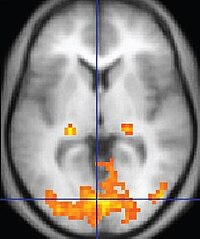
Photo from wikipedia
Despite the importance of physical education (PE) lessons for physical activity in adolescents, the acute cognitive responses to PE lessons have not been explored; a gap in the literature that… Click to show full abstract
Despite the importance of physical education (PE) lessons for physical activity in adolescents, the acute cognitive responses to PE lessons have not been explored; a gap in the literature that this study addresses. Following familiarisation, 76 (39 female) adolescents (12.2 ± 0.4 y) completed two trials (60 min games-based PE lesson and 60 min academic lesson) separated by 7-d in a counterbalanced, crossover design. Attention, executive function, working memory, and perception were assessed 30 min before, immediately post, and 45 min post-lesson in both trials. Participants were split into high-and low-fit groups based on a gender-specific median split of distance run on the multi-stage fitness test. Furthermore, participants were split into high and low MVPA groups based on a gender-specific median split of MVPA time (time spent >64% HR max) during the PE lesson. Overall, a 60 min games-based PE lesson had no effect on perception, working memory, attention, or executive function in adolescents (all p > 0.05) unless MVPA time is high. The physical activity-cognition relationship was moderated by MVPA, as working memory improved post-PE lesson in adolescents who completed more MVPA during their PE lesson (time*trial*MVPA interaction, p < 0.05, partial η2 = 0.119). Furthermore, high-fit adolescents displayed superior cognitive function than their low-fit counterparts, across all domains of cognitive function (main effect of fitness, all p < 0.05, partial η2 0.014–0.121). This study provides novel evidence that MVPA time moderates the cognitive response to a games-based PE lesson; and emphasises that higher levels of fitness are beneficial for cognitive function in adolescents.
Journal Title: Frontiers in Psychology
Year Published: 2023
Link to full text (if available)
Share on Social Media: Sign Up to like & get
recommendations!